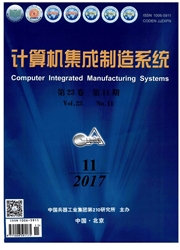

 中文摘要:
中文摘要:
针对零等待多产品厂调度问题的总流程时间最小化问题,提出一种改进粒子群算法。在该类问题中,产品在每台设备上的操作包括调整、加工和移除三部分,并以零等待方式进行生产。对生产过程的特殊性建立了调度问题的数学模型,在分析了标准粒子群算法所固有的缺陷的基础上提出一种带有创新因子的改进粒子群算法。通过在粒子的位置更新公式中加入创新因子,提高了粒子的随机性,使粒子不再单纯跟踪个体极值和群体极值,避免了粒子快速聚集到群体极值周围,同时扩大了搜索范围,使粒子获得了更好的“探索”能力,增强了种群在进化过程中的多样性,防止算法陷入局部最优,提高了算法的全局搜索能力。通过对不同规模问题的仿真求解,改进算法的优化结果明显优于标准粒子群算法和遗传算法,表明了改进算法的有效性和优越性。最后,仿真讨论了非零调整时间和非零移除时间对调度结果的影响。
 英文摘要:
英文摘要:
Aiming at the minimum total flow time of muhiproduct batch plant schedule problem with Zero Wait (ZW) policy, an improved particle swarm optimization was proposed. In these scheduling problems, the operation of products on any machine consisted of setup, processing and removal. For the specificity of production process, the math ematieal model of scheduling problem was built. Based on analyzing the inherent drawback of Standard Particle Swarm Optimization (SPSO), a new improved particle swarm optimization with innovation factors was declared. By adding innovation factor in the position update formula, the randomness of the particles were increased, which made particles no longer track individual extreme and global extreme solely, keep the particles away from the densely area to extend the search space and improve the population diversity in the process of evolution. It could prevent the par- ticles fall into local best and enhance the global research ability. Through the simulated solution, the improved algo- rithm was proved to have more remarkable performance than SPSO and GA, and the influence of non-zero transfer time and setup time on scheduling problem was analyzed.
 同期刊论文项目
同期刊论文项目
 同项目期刊论文
同项目期刊论文
 A Discrete Artificial Bee Colony Algorithm for Minimizing the Total Flow Time in the Blocking Flow S
A Discrete Artificial Bee Colony Algorithm for Minimizing the Total Flow Time in the Blocking Flow S A multi-population cultural algorithm with adaptive diversity preservation and its application in am
A multi-population cultural algorithm with adaptive diversity preservation and its application in am A hybrid discrete differential evolution algorithm to minimise total tardiness on identical parallel
A hybrid discrete differential evolution algorithm to minimise total tardiness on identical parallel An improved discrete artificial bee colony algorithm to minimize the makespan on hybrid flow shop pr
An improved discrete artificial bee colony algorithm to minimize the makespan on hybrid flow shop pr A novel 3-layer mixed cultural evolutionary optimization framework for optimal operation of syngas p
A novel 3-layer mixed cultural evolutionary optimization framework for optimal operation of syngas p An iterated greedy algorithm for the single-machine total weighted tardiness problem with sequence-d
An iterated greedy algorithm for the single-machine total weighted tardiness problem with sequence-d A Local and Global Search Combined Particle Swarm Optimization Algorithm and Its Convergence Analysi
A Local and Global Search Combined Particle Swarm Optimization Algorithm and Its Convergence Analysi An effective discrete artificial bee colony algorithm for flow shop scheduling problem with intermed
An effective discrete artificial bee colony algorithm for flow shop scheduling problem with intermed An improved Bayesian-based wavelet package denoising method for data reconciliation to coking chemic
An improved Bayesian-based wavelet package denoising method for data reconciliation to coking chemic Optimal Operation for 3 Control Parameters of Texaco Coal-Water Slurry Gasifier with MO-3LM-CDE Algo
Optimal Operation for 3 Control Parameters of Texaco Coal-Water Slurry Gasifier with MO-3LM-CDE Algo 期刊信息
期刊信息
